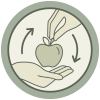
循环和互助经济:将生产者和消费者重新联系起来的循环和互助经济为我们在地球上的生活提供创造性的解决方案,并确保实现包容和可持续发展的社会基础
生态农业通过循环和互助经济将生产者和消费者重新联系起来,这种经济模式将本地市场置于优先位置,并通过创造良性循环支持本地经济发展。生态农业的方法以本地需求、资源和能力为基础,推动达成公平的解决方案,营造更加平等和可持续的市场。加强粮食短循环能增加粮食生产者的收入,保证消费者获得公平价格。这意味着要有新的创新性市场, ,与更传统的包含绝大多数小农产品的地区市场并存。
社会和体制创新在鼓励生态农业生产和消费方面扮演关键角色。一些有助于在生产者和消费者间建立联系的创新举措包括参与性担保机制、本地生产者市场、原产地标注、社区支持型农业和电子商务模式。这些创新性市场回应了消费者对更健康饮食的不断增长的需求。
根据循环经济的原则对粮食系统进行重设,将食物营养价值链变短变得更加节约资源,能帮助解决全球粮食浪费的挑战。目前,生产的所有粮食中有三分之一被损失或浪费,未能助力实现粮食安全和营养,同时加重了对自然资源的压力。在生产粮食的过程中损失和浪费的能源大约是世界消耗总能源的10%,每年粮食浪费产生的碳足迹相当于排放35亿吨温室气体二氧化碳。
Database
This document describes the main results that emerged from the application of the Tool for Agroecology Performance Evaluation (TAPE) developed by FAO on the IFAD-funded Regeneration of Landscapes and Livelihoods (ROLL) project in Lesotho.
TAPE provided a baseline for analyzing and comparing the performance of different types of agricultural systems across multiple dimensions of...
Lesotho
论文
2022
The increasing demand for more nutritious and safe food in Asia is creating both market opportunities and challenges for organic farmers. Obtaining access to this market requires certification, and many smallholder farmers lack the capacity to differentiate their organic products from the conventional products. This prevent smallholder farmers from profiting...
Cambodia - Lao People's Democratic Republic
报告
2019
This video depicts the second session of the second day of the regional consultation on ‘’Engaging with Academia and Research Institutions (ARIs) to support Family Farmers and Food System Transformation during and post COVID-19 Pandemic in Asia’’ held on 8 and 9 December 2021.
The video focuses on ARIs’ experiences from the Asia region...
视频
2021
